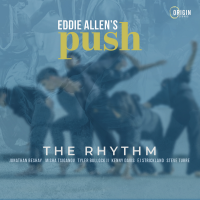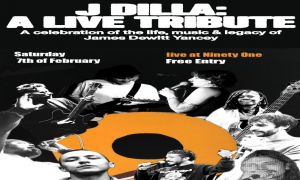Bringing together the talents of these three respected bandleaders and instrumentalists, the concert will feature hard-swinging jazz played by: Michael Brecker, one of the music's most influential saxophone players, with a quartet that includes Adam Rogers, guitar; John Patitucci, bass; and Clarence Penn, drums; Dave Holland, a living legend of jazz music and one of the most important jazz bassists performing today, with his long-running quintet that includes Chris Potter, tenor saxophone; Robin Eubanks, trombone; Steve Nelson, vibraphone; and Billy Kilson, drums; and J@LC Artistic Director and virtuoso trumpeter Wynton Marsalis with special guest tenor saxophonist Joe Lovano and the members of his septet including Sherman Irby, alto saxophone; Victor Goines, tenor saxophone and clarinet; Ron Westray, trombone; Richard D. Johnson, piano; Reginald Veal, bass; and Herlin Riley, drums. This concert is sponsored by Cadillac.
Michael Brecker is a remarkable technician and a highly influential tenor saxophonist, arguably the biggest influence on other tenors since Wayne Shorter. He spent much of his career as a top-notch studio player who often appeared backing pop singers, leading some jazz listeners to overlook his very strong improvising skills. Brecker originally started on clarinet and alto before switching to tenor in high school. Early on, he played with rock and R&B-oriented bands. In 1969, he moved to New York, and soon joined Dreams, an early fusion group. Brecker was with Horace Silver during 1973-1974, gigged with Billy Cobham, and then co-led the Brecker Brothers (a commercially successful funk group) with his brother, trumpeter Randy Brecker, for most of the 1970s. He was with Steps (later Steps Ahead) in the early 1980s, doubled on an EWI (electronic wind instrument), and made a countless number of studio sessions during the 1970s and 1980s, popping up practically everywhere (including with James Taylor, Yoko Ono, and Paul Simon). With the release of his first album as a leader in 1987 (when he was already 38), Brecker started appearing more often in challenging jazz settings. He recorded additional sets as a leader (in 1988 and 1990), teamed up with McCoy Tyner on one of 1995's most rewarding jazz recordings, and toured with a reunited Brecker Brothers band. Two Blocks From the Edge followed in 1998, and a year later, Brecker returned with Time Is of the Essence. His most recent recording as a leader, Nearness of You: The Ballad Book, was released in spring 2001.
Dave Holland is of a generation of bassists who, in the 1960s and 1970s, built upon the innovations of slightly older players like Scott LaFaro, Gary Peacock and Barre Phillips, carrying the instrument to yet another new level of creativity. Holland is possibly the most accomplished pure jazz composer among bassists, after Charles Mingus. Holland's small groups in the 1980s and 1990s, while working firmly within the jazz idiom, presented a fresh alternative to the re-creations of the neo-boppers. Holland started playing ukulele at the age of four, switching to guitar at ten and bass guitar at 13. As a teenager he decided to try to make a living as a musician. Under the influence of such jazz bassists as Leroy Vinnegar and Ray Brown, Holland took up the double bass, learning primarily by playing along with records. He began playing professionally shortly thereafter. Holland studied with James E. Merritt, the principal bassist with the London Philharmonic who recommended him to the degree program at the Guildhall School of Music and Drama. At Guildhall, Holland gained experience in a variety of styles, from orchestral music to New Orleans jazz to bebop and beyond. In 1966, he began playing with many of the musicians with whom he would collaborate over the next two decades - musicians like trumpeter Kenny Wheeler or saxophonist John Surman. In July of 1968, Miles Davis heard him at Ronnie Scott's and asked him to join his band. Holland promptly relocated to New York and participated in the making of several classic Davis recordings, including In a Silent Way and Bitches Brew. In the early 1970s, he co-founded (with Anthony Braxton, Chick Corea, and Barry Altschul) the group Circle, who embraced free jazz concepts, and he played with Stan Getz, Thelonious Monk, and Sam Rivers. In 1975, he formed the Gateway Trio, a group who would continue to record and tour intermittently for the next 25 years. In the early 1980s, Holland worked extensively with Sam Rivers, and organized his own band, a quintet with Wheeler, Julian Priester (trombone), Steve Coleman (alto sax), and Steve Ellington (drums). Although the personnel would vary, the band would ultimately draw their identity from Holland's compositions. In the 1980s and 1990s, Holland worked as an educator, heading the summer jazz workshop at the Banff School in Banff, Alberta, Canada from 1983 until 1990. From 1987 until 1990 he was a faculty member at the New England Conservatory of Music. Aside from leading his own group, Holland's musical activities in the 1990s included projects with DeJohnette, Gateway, and Herbie Hancock. He also recorded with Joe Lovano, Gary Burton, and Jim Hall.
Saxophonist Joe Lovano has developed into one of today's most formidable and stylistically eclectic tenor saxophonists. Born in Cleveland on Dec. 29, 1952, Lovano's early work started when he was a teenager in bands led by his father. He remained a relative journeyman, playing with, among others, Lonnie Liston Smith from 1974-1976, and Woody Herman, from 1976-1979. It was after his tenure with Herman, however, that his celebrated association with drummer Paul Motian began, when he was in his late 20s. Touring internationally and playing at festivals and clubs across the country, Lovano made a number of significant recordings while with Motian's group, which, at times, also included guitarist Bill Frisell. This band played everything from show tunes to originals to compositions by Thelonious Monk. Lovano's notoriety as a strong tenor player continued when he went on to play and record in John Scofield's band. Beyond his work with Scofield, Lovano has become a significant leader of his own bands and projects. Among the highlights are his Wind Ensemble, a collaboration with conductor Gunther Schuller, and more recent collaborations with bassist Dave Holland and drummer Elvin Jones as well as saxophonist Greg Osby. Recordings include Viva Cauruso (Blue Note, 2002), Friendly Fire (with Greg Osby, Blue Note, 1999), Trio Fascination (with Dave Holland and Elvin Jones, Blue Note, 1998), and Rush Hour (with Gunther Schuller, Blue Note, 1995).
Wynton Marsalis is the Artistic Director of J@LC. Born in New Orleans, Louisiana in 1961, Mr. Marsalis began his classical training on trumpet at age 12 and soon began playing in local bands of diverse genres. He entered The Juilliard School at age 17 and joined Art Blakey and the Jazz Messengers. Mr. Marsalis made his recording debut as a leader in 1982, and since he has recorded more than 30 jazz and classical recordings, which have won him nine Grammy Awards. In 1983, he became the first and only artist to win both classical and jazz Grammys in the same year and repeated this feat in 1984. Mr. Marsalis's rich body of compositions includes Sweet Release, Jazz: Six Syncopated Movements, Jump Start, Citi Movement/Griot New York, At the Octoroon Balls, and In This House, On This Morning and Big Train. In 1997, Mr. Marsalis became the first jazz artist to be awarded the prestigious Pulitzer Prize in music, for his oratorio Blood on the Fields, which was commissioned by J@LC. In 1999, he released eight new recordings in his unprecedented “Swinging into the 21st" series, and premiered several new compositions, including the ballet Them Twos, for a June 1999 collaboration with the New York City Ballet. That same year he premiered the monumental work All Rise, commissioned and performed by the New York Philharmonic along with the Lincoln Center Jazz Orchestra (LCJO) and the Morgan State University Choir in December 1999. All Rise was released on CD October 1, 2002 by Sony Classical. Recorded on September 14 and 15, 2001 in Los Angeles in those tense days following 9/11, the All Rise CD features the LCJO along with the Los Angeles Philharmonic, the Morgan State University Choir, the Paul Smith Singers and the Northridge Singers. Mr. Marsalis is also an internationally respected teacher and spokesman for music education, and has received honorary doctorates from dozens of universities and colleges throughout the U.S. He conducts educational programs for students of all ages and hosts the popular Jazz for Young PeopleSM concerts produced by J@LC. Mr. Marsalis has also been featured in the video series Marsalis on Music and the radio series Making the Music. He has also written two books: Sweet Swing Blues on the Road in collaboration with photographer Frank Stewart, and recently released Jazz in the Bittersweet Blues of Life with Carl Vigeland. On March 20, 2001, Mr. Marsalis was named a United Nations Messenger of Peace by UN Secretary-General Kofi Annan. He is helping to lead the effort to construct J@LC's new home Frederick P. Rose Hall the first education, performance, and broadcast facility devoted to jazz, slated to open in fall 2004.
For more information contact All About Jazz.



























